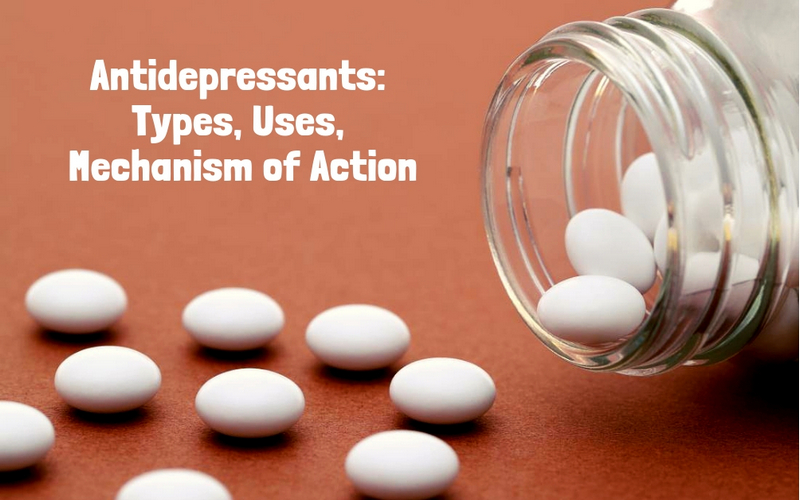Antidepressants: Types, Uses, Mechanism of Action

If you are wondering what to choose when you buy antidepressants online, the advice is simple: you always need to go for the one that will work best for you. There are a few different kinds of antidepressants working in a slightly different way for the patient and causing a different response. Our brain is a complex system that contains around 10 billion cells, each one with over 25 thousand connections to other cells for passing messages. Depression is often attributed to an imbalance of neurotransmitters – chemicals that ensure the message is passed successfully. The largest groups of antidepressants available include selective serotonin reuptake inhibitors, monoamine oxidase inhibitors and tricyclic antidepressants.
Types of antidepressants
- Selective serotonin reuptake inhibitors are designed for increasing the amount of serotonin in the synapse by preventing its reabsorption by the cell. A synapse is a small gap between two cells crossed by the signal with the help of a neurotransmitter, which is later reabsorbed by the sending cell. The action of selective serotonin reuptake inhibitors is specific to serotonin, which allows using those antidepressants with fewer side effects that are also less bothersome;
- Monoamine oxidase inhibitors were among the first antidepressants developed. They work by inhibiting an enzyme called monoamine oxidase, which breaks down neurotransmitters responsible for your mood, such as norepinephrine and serotonin. Monoamine oxidase inhibitors may not be the first choice drugs because of their potentially fatal interactions with other drugs, numerous dietary restrictions and side effects that need to be monitored carefully;
- Tricyclic antidepressants work by inhibiting the ability of the nerve cell to reuptake serotonin and norepinephrine. As a result of that, the nerve cells have more of those two substances to use while passing the signals. The drawback of using tricyclic antidepressants is that they may not be used by patients with a specific kind of medical history and cause a number of side effects that are undesirable.
There are also other antidepressants that do not fall into any of those categories and work in their own unique way inhibiting the reuptake of certain neurotransmitters and giving other benefits to the patient. Each of the antidepressants present in the market increases the levels of specific neurotransmitters in the brain, which will happen in slightly different parts of the brain. Every person’s drug needs are different when it comes to antidepressants because every problem like that is individual.
Antidepressants are all different
The action, indications, interactions and side effects of antidepressants differ. A particular patient may not respond to one type of antidepressant and feel the effect of another, while another person with a similar condition may respond in a different way.
Most antidepressants take effect in a few weeks. They are usually taken for several months or several years.
Lack of compliance is a serious problem for the best use of such drugs. Compliance with the treatment regimen includes the timely taking of pills every day, without forgetting to take them, etc. Depressed patients may not like to wait several weeks to achieve a result, and many cancel drugs before they start working.
Despite their name, antidepressants are medicines that can be used to treat several different types of diseases and conditions, and not all of them are psychiatric.
Primary (approved) antidepressant medications are intended for the treatment of:
- Agitations;
- Obsessive-compulsive disorders (OCD);
- Pediatric enuresis (urinary incontinence);
- Depressed;
- Generalized anxiety disorder;
- Major depressive disorder;
- Manic-depressive disorder;
- Post-traumatic stress disorder (PTSD);
- Social anxiety disorder.
Some “unmarked” antidepressant uses (for unconfirmed indications) include:
- Eating disorder;
- Bulimia;
- Chronic urticaria;
- Fibromyalgia;
- Osteoarthritis pain – An article in the International Journal of Clinical Practice reports that antidepressants can be effective in alleviating the symptoms of pain in osteoarthritis. The authors added that there may also be fewer side effects compared with anti-inflammatory and opioids that are traditionally prescribed;
- Diabetic peripheral neuropathic pain;
- Neuropathic pain;
- Hyperhidrosis (caused by drugs) – excessive sweating;
- Premenstrual Symptoms – Researchers at the University of Pennsylvania School of Medicine reported that many women who take sertraline for severe premenstrual symptoms go through a relapse within six to eight months after they stop taking the pills;
- Rurite (itching);
- Tourette syndrome;
- Migraine;
- Snore.
Researchers from the Yale University sister school and the Center for the Study of Children have identified that antidepressants have been found to be ineffective in treating repetitive behavior in children with autism.

